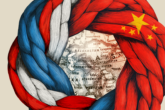
September 27, 2018
China in the World Podcast: The U.S. and China as Peer Competitors in the Indo-Pacific
The Trump administration has taken a more confrontational approach to bilateral relations with China, implementing tariffs on nearly half of all Chinese exports to the U.S. and treating Beijing as a strategic competitor across many aspects of the relationship. In this podcast, Paul Haenle spoke with Abigail Grace, a research associate in the Asia-Pacific Security Program at the Center for a New American Security, on the changing dynamics of U.S. relations with China and the U.S. Free and Open Indo-Pacific strategy.
Grace discussed the evolution of U.S. foreign policy toward China, drawing on her experience in the National Security Council in both the Obama and Trump administrations. While President Obama focused on working with China to advance multilateral initiatives such as the Paris Climate Agreement and Joint Comprehensive Plan of Action (JCPOA), President Trump has made leveling the playing field for trade and economic relations the priority for the relationship. Grace argued that tariffs have been effective in shifting the focus of bilateral discussions to the economic relationship, but may not lead to any concrete progress on the fundamental strategic issues which the U.S. seeks to resolve. Language in the National Security Strategy labeling China a strategic competitor and revisionist power should not be framed negatively, Grace argued. Instead, such language recognizes Beijing’s elevated status and growing influence on the international stage. Grace said the Trump administration’s Free and Open Indo-Pacific and the Obama administration’s Pivot to Asia strategies both recognize the importance of U.S. engagement in Asia in the 21st century. The administration now faces the challenge of balancing its strategy’s economic, security, and governance components while at the same time upholding U.S. values.
Listen to this episode of the Carnegie-Tsingua Center's "China in the World Podcast" here.
More from CNAS
-
The Future of Russia and China in Central Asia
Despite the many proclamations that Russian and Chinese interests would collide in Central Asia, Moscow and Beijing continue to work together in service of their shared object...
By Andrea Kendall-Taylor & Jim Townsend
-
Russia and China in Central Asia
Executive Summary Despite the many proclamations that Russian and Chinese interests would collide in Central Asia, Moscow and Beijing continue to work together in service of t...
By Andrea Kendall-Taylor, Lisa Curtis, Kate Johnston & Nathaniel Schochet
-
‘Trump Will Use His Strength For Peace': Ex White House Official
Lisa Curtis, Director of Indo Pacific Security Program at the Centre For A New American Security, says that in his second term, Donald Trump has learnt to be careful with his ...
By Lisa Curtis
-
Trump vs. Harris: Who Holds The Edge On Election Eve? Discussing With Lisa Curtis
CNBC-TV18 spoke to Lisa Curtis, from the Indo-Pacific Security Program at the Center for a New American Security, to examine the key election trends as the U.S. presidential r...
By Lisa Curtis




